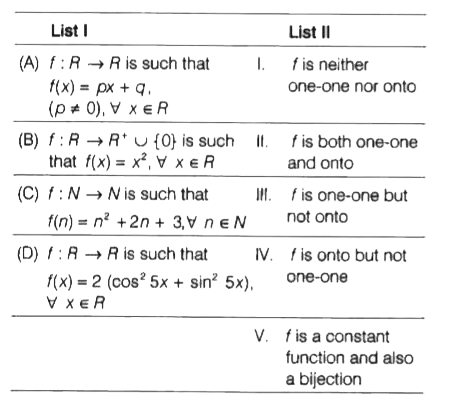The two events E1,E2 are such that
P(E1∪E2)=58,P(¯¯¯E1)=34,P(E2)=12, then E1 and E2 areSolution in Telugu
independent events
mutually exclusive events
exhaustive events
not independent events
The correct Answer is:A
Step by step video, text & image solution for The two events E_(1), E_(2) are such that P(E_(1)uuE_(2))=5/8, P (bar(E)_(1))=3/4, P(E_(2))=1/2, then E_(1) and E_(2) are by Maths experts to help you in doubts & scoring excellent marks in Class 12 exams.
Updated on:21/07/2023Topper's Solved these Questions
Similar Questions
If f:R→R,g:R→R are defined by f(x)=5x−3,g(x)=x2+3, then (gof−1)(3)=
View SolutionMatch the following

The correct answer is
View SolutionIf E_(1) and E_(2) are two independent events such that P(E_(1))=(1)/(2),P(E_(2))=(7)/(12),P(bar(E)_(1)nnbar(E)_(2))=(1)/(4) check whether E_(1) and E_(2) are independent events or not
View SolutionIf E_(1) and E_(2) are events of a sample space such that P(E_(1))=(1)/(4),P((E_(2))/(E_(1)))=(1)/(2),P((E_(1))/(E_(2)))=(1)/(4) Then P((E_(1))/(E_(2)))=
View SolutionIf E_(1),E_(2), are two events with E_(1)nn E_(2)=phi then P(bar(E)_(1)nnbar(E)_(2))=
View Solutionif E1 and E2 are two events such that P(E1)=14,P(E2E1)=12 and P=(E1E2)=14
View SolutionIf E1 and E2 are two events such that P(E1)=1/4, P(E2/E1)=1/2 and P(E1/E2)=1/4, then
View SolutionIf E1 and E2 are the two events such that P(E1)=14,P(E2)=13 and P(E1∪E2)=12, show that E1 and E2 are independent events.
View Solutionनिम्नलिखित कथनो पर विचार कीजिए
I. यदि दो घटनाएँ E1 तथा E2 इस प्रकार हो कि P(E2)=1,P(E_(1))=1/2, P(E_(1)nnE_(2))=1/2 हो तब E1 तथा E2 स्वतंत्र घटनाएँ होगी|
II. दो घटनाएँ E1 तथा E2 स्वतंत्र होगी, यदि और केवल यदि
P(E1∩E2)=P(E1)⋅P(E2)
उपरोक्त कथनो में से कौन-सा/से कथन सही है/हैं?
View SolutionIf E1,E2, are independent events, such that P(E1∩E2)=1/4,P(¯¯¯E1∩¯¯¯E2)=1/4, then P(E1)+P(E2)=
View SolutionIf E1,E2, are independent events, such P(E1∩E2)=1/8,P(¯¯¯E1∩¯¯¯E2)=1/4, then P((E1+P(E2)=
View SolutionIf E1,E2,E3 are independent events, such that P(E1∩¯¯¯¯E2∩¯¯¯¯E3)=14,P(¯¯¯¯E1∩¯¯¯¯E2∩¯¯¯¯E3)=18,P(¯¯¯¯E1∩E2∩¯¯¯¯E3)=18. Find P(¯¯¯¯E3)
View SolutionSuppose E1 and E2 are two events of a random experiment such that P(E1)=14,P(E2E1)=12 and P(E1E2)=14 then P(E2)=
View Solutionconsider an event E=E1∩E2∩E3 find the value of P(E) if P(E1)=25,P(E2E1)=15 and P(E3E1E2)=110
View SolutionE1, E2 are events of a sample space such that P(E1)=14, P(E2E1)=12, P(E1E2)=14 then P(E1E2)+P(E1¯¯¯E2)=
View Solution

